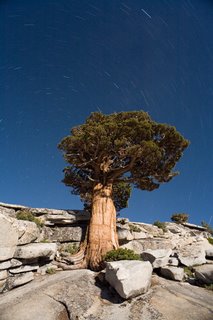In-Camera Noise Reduction
Night photographers seem to be fascinated with how different digital cameras perform under long exposures. The goal has always been to find how long the camera can shoot before it introduces noise. In fact, I jumped over to the Dark Side four years ago with the D60 because it seemed to be the first digital SLR that could shoot clean images longer than 30 seconds. Today, the D60's four-minute limit pales in comparison with it's successors.
There seem to be six popular approaches to solving the problem of long exposure digital noise.
At the Night Photography Conference at Mono Lake last week, Joe Reifer and Mark Jaremko conducted some long exposure tests with the Canon EOS 5D and the 1DsMk2.
Joe has posted some interesting findings of the 5D noise reduction on the Nocturnes Message Board. We can only hope that a 1DsMk2 report will be forthcoming, too.
There seem to be six popular approaches to solving the problem of long exposure digital noise.
- Keep the exposures short.
- Keep the camera as cool as possible without freezing it.
- Use noise reduction post-procssing software, such as Noise Ninja.
- Use in-camera dark frame subtraction
- Use dark frame subtraction in post-processing
- Keep buying the latest and greatest cameras.
At the Night Photography Conference at Mono Lake last week, Joe Reifer and Mark Jaremko conducted some long exposure tests with the Canon EOS 5D and the 1DsMk2.
Joe has posted some interesting findings of the 5D noise reduction on the Nocturnes Message Board. We can only hope that a 1DsMk2 report will be forthcoming, too.


6 Comments:
Thanks for the post. The 5D and Mark II are well beyond my budget. Do any of the more affordable cameras have acceptable performance (no major hot spots, etc) for 3-6 minute exposures?
Roger
what about the 10d, 20d, 30d ?
The 10D and 20D are both great in the 3-6 minute range without noise reduction. Both will have a few hot pixels that are easily cloned out. I read somewhere that the 30D will let you keep on shooting with noise reduction cueing up in the buffer, but please confirm before purchasing.
An even more affordable DSLR, the four year-old D60, performs reasonably well between 3-4 minutes. Almost everything on my website and my Flickr account were taken with a D60. In mild weather it performs well up to 3 minutes, and in colder weather (40 deg) it performs well up to 4 minutes (although you can expect some hot pixels which can easily be cloned out, or removed with manual dark frame subtraction).
But the 10D is a siginificantly better built camera than the D60 (specifically the metal body). For that reason, plus the slightly better night capability, I would go for the 10D if you're on a budget.
Thanks for the replies, Joe and Andy. It's interesting that Canon seems to have the night locked up.
I wouldn't give the 10d such a high rating... I have one abd seem to be having multiple hardware problems and yhe repair s can only be done at a canon depot.
I have goyyen some awesome night work with , but am now moving more towards the 5 d as it has less noise attributes and the colors can be a little more in the range I'd prefer pre processing.
Post a Comment
<< Home